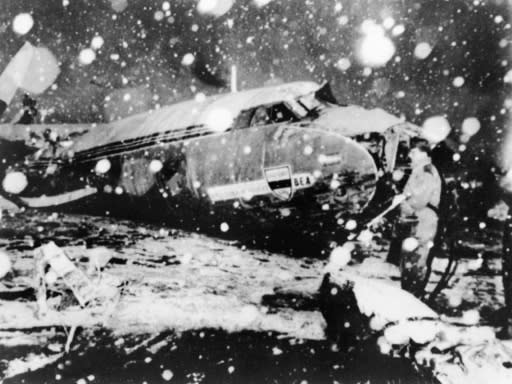Harry Gregg, Manchester United's 'reluctant hero'
Harry Gregg was uncomfortable talking about bravery after the Munich air disaster, and former Manchester United manager Alex Ferguson best summed him up as "a most reluctant hero". Softly-spoken Gregg, who died aged 87 on Monday, stands tall among goalkeeping greats, even beating Soviet legend Lev Yashin to the accolade of best goalkeeper at the 1958 World Cup finals. However, the courage he showed on February 6, 1958, went far beyond anything he achieved on the pitch. He was told by the pilot the plane was about to explode. But he did not hesitate to go back in -- again and then again -- to pull people from the wreckage after the plane crashed on its third take-off attempt in terrible weather conditions. In all, 23 people, eight of his team-mates, three of the club's backroom staff, two crew, eight journalists and two others, died. He succeeded in rescuing manager Matt Busby, team-mates Bobby Charlton, Jackie Blanchflower and Dennis Viollet, plus the wife of a Yugoslavian diplomat, Vera Lukic -- who was pregnant with her son Zoran -- and her young daughter Vesna. Gregg returned to Belgrade -- where the ill-fated flight had begun -- in 2007 and met Zoran. "I have always wanted this moment, to look into your face and say to you, 'Thank you'," said Zoran. Gregg -- who fractured his skull in the crash but was back between the posts 13 days later playing against Sheffield Wednesday -- played it down in typical style. "I've lived with being called a hero but I'm not really a hero," he replied to Zoran. "Heroes are people who do brave things knowing the consequences of their actions. That day, I had no idea what I was doing." - 'I carried his coffin' - Gregg could describe in detail how he had gone back for Zoran's mother and sister. "I got out of the plane and there's five people running for it and (Captain James) Thain said 'Run you stupid bastard, the plane's about to explode' and I was about to run when I heard a child crying." He went back into the wreckage to pull out the baby, then returned again in search of the mother. "The radio operator took the child from me and I went back into the debris and I found her mother who was in a bad condition. "I kicked a hole in the fuselage and I pushed her out." Gregg -- who became the world's most expensive goalkeeper when United bought him from Doncaster Rovers for �23,500 in 1957 -- described himself as having a stubborn streak "as long as the strand at Portstewart", the seaside town in County Londonderry where he used to walk every day in his retirement. However, even he felt emotional when Ferguson and United showed their appreciation of him by sending a team to Belfast for his testimonial in 2012 just days after they had lost the Premier League title on the final day of the season. "Manchester United mean a lot to me, it was a great part of my life and still is," said Gregg, who had suffered a stroke that year. "That's why I feel very emotional, very moved that they have remembered an old carpenter like me." Gregg, who lost his first wife Mavis aged just 26 from cancer and his daughter Karen aged 50, said he always had a soft spot for fellow Northern Irishman George Best, who used to clean his boots as an apprentice at Old Trafford. "George and I were good friends," Gregg recalled in 2017. "I spoke to him last on the phone when he was in hospital (2005). He cried and said: 'Greggy, ring me tomorrow'. "I did but the silly bugger had signed himself out. The next memory is when Denis Law and I carried his coffin." Best had already left his lasting tribute to Gregg in the foreword of the latter's 2002 autobiography, even though the goalkeeper in all his modesty would probably have bristled at it. "My hero," wrote Best. A rescue worker stands next to the debris of the plane carrying Manchester United players that crashed at Munich airport in 1958 Gregg played at the 1958 World Cup for Northern Ireland



